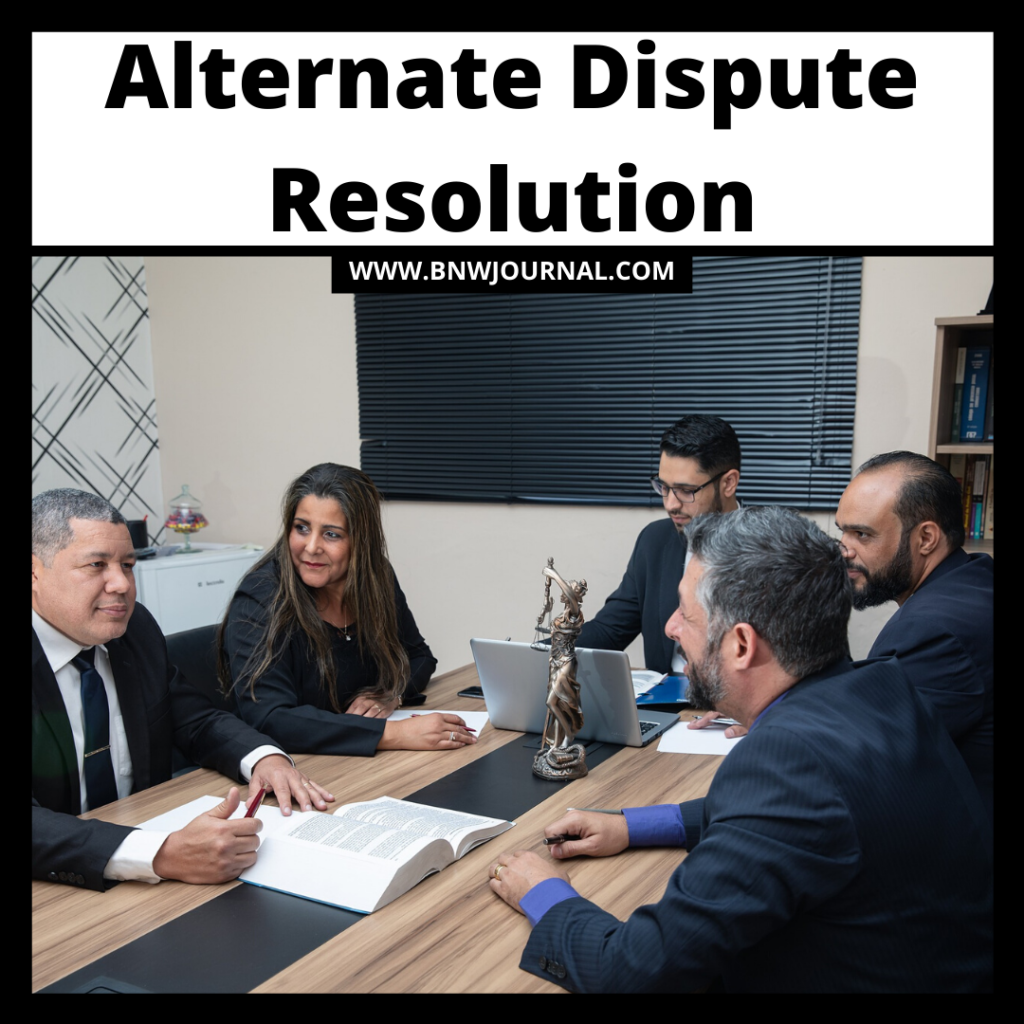![]()
Discourage litigation. Persuade your neighbours to compromise. Whenever you can point out to them how the nominal winner is often a real loser, in fees, expenses, and waste of time.
Abraham Lincon
Definition
Alternative Dispute Resolution, also referred to as ADR, is a method of resolving matters/cases outside a court. No litigation takes place in this type of resolution. Public Courts may be question on the validity of the orders and ask to change the decision. But, it rarely happens that ADR will alter the decision they give.[1]

Background
Method of Alternative Dispute Resolution was adopt from the old age process of ‘Panchayat System’. A person of higher position, power or status was select by the village people. They ask him to take the position as “Sarpanch”. He, with few more respected and old people of the village, take all the decision. It will be regarding any issue which takes place in the area. The dispute regarding property, family quarrels and caste issues were deal with in it.
The sole purpose of the panchayat system was to look after law and order in the village. Also to have proper coordination among the villagers and uphold the work of welfare in the concerned area. That is the time when small issues which are less harmful for the society is not refer by the courts. But, due to biasness and unprofessionalism in stating a matter, the system of panchayat got faded with time.
Mode of ADR
There are four types of Alternative Dispute Resolution methods:
- Conciliation,
- Mediation,
- Arbitration &
- Adjudication.
The above-mentioned modes are explained below.
I. Conciliation
It is an ADR technique in which a third party, generally known as a conciliator, help the parties involve to reach to proper issues, produce options, give advice and try to conclude/resolution by the of an agreement.
As conciliator is involve in this method, he/she may have expertise in one of the subject matter and gives advice to the parties and come to a resolution for disposal of the case. A conciliator can be a voluntary, court-approve or as per mention in a contract. However, the person appointed as conciliator cannot give decision or judgement regarding the dispute he/she dealing with.
A conciliator can have sessions face-to-face or telephonic conversation and may hold separate time for each party to have a session with them.[2]
II. Mediation
It is an ADR process in which a third party is make a mediator which help the parties to know about the specific issues, to develop options and by themselves come to a dispute resolution.
It can only assist them in their issues and problems, but, cannot give their advice or opinion regarding the issues raised and can also not give any decision or judgement in the case.
A mediation period is always taking place face-to-face between the parties involve and one or more than one mediator is present. During mediation, the parties are ask to directly communicate, give their opinion and come to a resolution. They may ask, for a separate session with the mediator, at any point of time. From time to time they will take a break and discuss the advice given by one party and can also ask for assistance and clarification if they want.
Like conciliator, a mediator can also be voluntary, court-approve or as per mention in a contract. Most of the time, he/she is the person appoint by the government or approve by the court.[3]
III. Arbitration
Arbitration is an ADR process in which an independent third party, an arbitrator, is appoint in front of whom the parties present their arguments and evidence; and in result of which the person appointed gives a binding decision. Arbitration is more useful in the cases where there is more technicality & parties are more confident than on an open court.
Process of Arbitration is more formal and structured in contrast to what is there in conciliation & mediation. It’s somewhere like a Court because, in the end, the arbitrator who deals with the case gives a binding decision for both the parties.[4]
IV. Adjudication
Adjudication is also a part of the ADR process in which an independent third party, reffer as Judge or Adjudicator, listen to the arguments of both the sides and gives a decision. It involves a faster process, usually of 28 days, for both the parties to put forward their issues and case in a form of response or notice. As it is a more formal type of process, the contract between the parties provides with the option of how an adjudicator should be chosen i.e., by professional bodies.
Major aspect of adjudication is the speed and the time-effective cost procedure which is followed, like that in an arbitration process. It is more like a court type of situation. Generally, it has no drawbacks but lack of proper evidence may lead to injustice with the parties and the amount invested is also non-recoverable. Both points should be kept in mind while going for this mode of ADR.[5]
When ADR is applied?
Alternative Dispute Resolution is mainly cheaper and a faster means of getting to a resolution than to approach a court and ask for a hearing. Somehow, if the communication is not break between the parties, it should be treat as the most effective way for settling down a case arising out of a dispute. It is not just effective but also help the parties to have privacy in the matter they are arguing on. Nowadays the mode of ADR is mostly being use by reputed companies and businesses as it provides privacy to the matter and also helps to protect the brand name and reputation of the concern businesses.[6]
Conclusion
Alternate Dispute Resolution is a method of resolving issues and cases outside the court of law. Methods which are provide in here are in addition to the process of litigation and not replace litigation. Even many eminent scholars and legal philosophers say that the degree of justice provided by the courts makes it an obligation for many cases to be presented and resolved by them.
References:
[1]Alternative Dispute Resolution, available at: https://www.law.cornell.edu/wex/alternative_dispute_resolution (visited on May 1, 2020).
[2]See, Alternative Dispute Resolution, Conciliation, available at: http://www.localcourt.justice.nsw.gov.au/Pages/adr/types_adr/conciliation.aspx (visited on May 1, 2020).
[3]Alternative Dispute Resolution, Mediation, available at: http://www.localcourt.justice.nsw.gov.au/Pages/adr/types_adr/mediation.aspx (visited on May 1, 2020).
[4]Alternative Dispute Resolution, Arbitration, available at: http://www.localcourt.justice.nsw.gov.au/Pages/adr/types_adr/arbitration.aspx (visited on May 1, 2020).
[5]Arbitration. Adjudication. Mediation. Alternative Dispute Resolution: does it work?, available at: https://www.griffin.law/arbitration-adjudication-mediation-alternative-dispute-resolution-work/ (visited on May 1, 2020).
[6]Alternative Dispute Resolution, available at: https://www.rocketlawyer.com/gb/en/quick-guides/alternative-dispute-resolution (visited on May1, 2020).



0 Comments